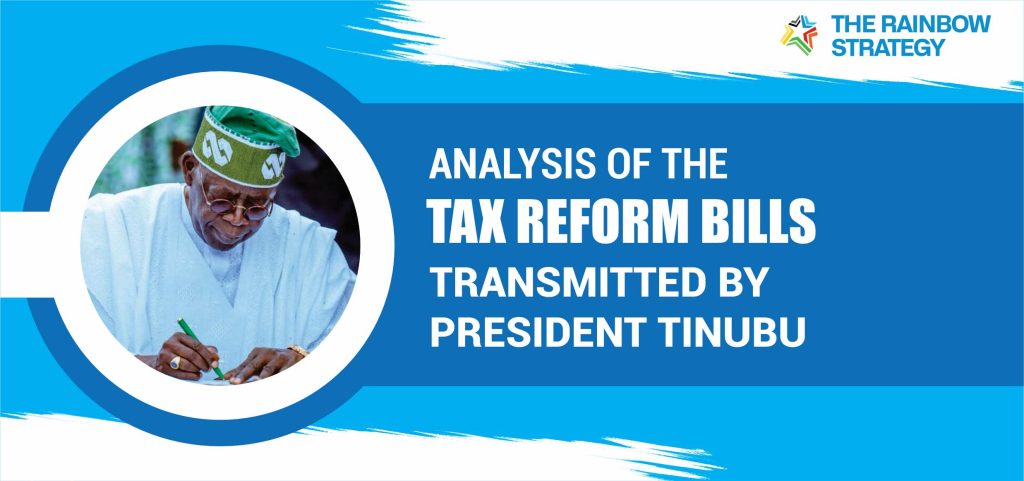The Nigeria Tax Reform Bills (NTB) 2024 represents a bold step towards overhauling Nigeria’s tax system, promoting economic growth, and addressing inefficiencies.
The Rainbow Strategy in this analysis presents a structured summary of the key highlights and developments, reflecting the challenges and opportunities shaping the fiscal framework of the Nigerian economy.
- Comprehensive Integration: Nigeria Tax Bill (NTB), 2024
The NTB seeks to harmonise and consolidate disparate tax laws into a single framework, eliminating overlaps and conflicts. This reform is poised to simplify the tax regime, enhance compliance, and reduce administrative burdens on businesses and individuals.
Key Implications:
- Centralization of Revenue Collection: The Nigeria Revenue Service (NRS) will replace the FIRS and take over tax collection duties previously handled by multiple agencies, including royalties and excise duties. This reduces inter-agency conflicts and inefficiencies.
- Pro-Poor Personal Income Tax (PIT) Reform: The NTB introduces progressive tax rates, exempting those earning less than ₦800,000 annually, which constitutes a significant portion of Nigeria’s population. This measure is socially inclusive and aligns with poverty alleviation goals.
- Business-Friendly Corporate Tax Reforms: The reduction in company income tax rates (from 30% to 25%) and the exemption of small businesses (turnovers below ₦25 million) signal a commitment to fostering entrepreneurship and reducing barriers for SMEs. Harmonising various levies into a single development levy further eases compliance.
- VAT Increment and Targeted Relief: While the gradual VAT increase (up to 15% by 2030) could raise revenue, exemptions for basic goods consumed by low-income earners mitigate regressive impacts.
- Modernizing Tax Administration: Nigeria Tax Administration Bill
This bill aims to enhance transparency, accountability, and efficiency in tax collection and enforcement.
Key Innovations:
- Transaction-Based Monitoring: Mandating financial institutions to report individuals with monthly transactions exceeding ₦25 million targets high-net-worth individuals for better compliance.
- Streamlined Dispute Resolution: Introducing modern mechanisms to resolve tax disputes could enhance investor confidence and fairness.
- Digital Compliance Systems: Leveraging technology to monitor tax obligations ensures real-time updates and minimizes evasion.
- Establishing a Unified Tax Authority: Nigeria Revenue Service (NRS)
Replacing the FIRS with the NRS centralises authority, reducing fragmentation in tax administration.
Potential Benefits:
- Enhanced Coordination: A unified revenue body will likely reduce duplicative processes and streamline enforcement mechanisms.
- Improved Data Utilization: Consolidated systems allow for better data analysis, enabling more accurate forecasting and planning.
Challenges:
- Transition Complexity: Reorganising multiple agencies into one unified body requires robust planning to avoid service disruptions.
- Inter-Agency Pushback: Agencies losing revenue collection powers may resist the transition, requiring strong leadership to ensure compliance.
- Rationalisation of Revenue Boards: Joint Revenue Board Establishment Bill
This bill proposes a platform for coordination among tax authorities across federal, state, and local levels.
Significance:
- Consistency in Tax Policies: A Joint Revenue Board (JRB) facilitates uniform interpretation and application of tax laws, reducing jurisdictional conflicts.
- Data Sharing: The JRB enhances collaboration, especially in identifying taxable entities and preventing leakages.
Broader Implications of the Reform Bills
Economic Impacts:
- Revenue Generation: The gradual VAT increment and broader tax net are designed to address Nigeria’s fiscal deficit, ensuring sustainable revenue for public services.
- Investment Climate: Reduced corporate taxes and simplified levies improve Nigeria’s ease of doing business ranking, attracting domestic and foreign investment.
- SME Development: Exemptions for small businesses align with goals of fostering grassroots economic activity and job creation.
Social Justice:
- Pro-Poor Policies: Exemptions for low-income earners and zero-rated essential goods ensure the reforms do not disproportionately burden vulnerable populations.
- Equitable Taxation: Progressive income tax rates ensure wealthier individuals contribute a fairer share of taxes.
Administrative Efficiency:

- Reduced Bureaucracy: Consolidation will minimise red tape, lowering compliance costs for taxpayers and administrative costs for the government.
- Technology Adoption: Digital platforms mandated by the bills should improve monitoring and reduce corruption.
Challenges and Risks
- Implementation Hurdles: Transitioning to a centralised system may face resistance and operational challenges.
- Public Perception: Despite targeted exemptions, the VAT increase may fuel narratives of over-taxation if not effectively communicated.
- Institutional Weaknesses: Effective execution depends on the capacity and integrity of the NRS and other bodies.
Contentions and Concerns
- Regional Disparities:
-
- The proposed Value-Added Tax (VAT) sharing formula has sparked backlash, particularly from northern governors, who argue it disproportionately benefits states like Lagos and Rivers at the expense of others.
- Critics fear a centralisation of tax authority, which could diminish states’ financial autonomy.
- Consultation and Legislative Concerns:
-
- Calls for broader consultations have emerged from key stakeholders, including the Northern Governors’ Forum and some senators.
- Despite these concerns, the bills have advanced to the second reading in the Senate.
- Economic Implications:
-
- Governor Babagana Zulum of Borno State and other critics warn that the reforms could exacerbate regional inequalities and have unintended consequences on Nigeria’s economic stability.
Addressing the Controversy
Ostensibly, President Tinubu’s directive for the Ministry of Justice to collaborate with the National Assembly aims to reflect a commitment to addressing concerns while preserving the legislative process. With this reactionary approach to encouraging informed dialogue and dispelling misinformation, the administration hopes to align stakeholders toward the reform’s broader goals.
Outlook and Strategic Considerations
The Rainbow Strategy believes that ongoing debate on the Tax Reform Bills will likely intensify as legislative processes unfold. Achieving a consensus will require:
- Inclusive Stakeholder Engagement: Ensuring all regions and economic sectors feel represented in the reform outcomes.
- Clear Communication: Addressing misinformation and clarifying the economic benefits for the public and state governments.
- Equity in Revenue Sharing: Balancing fiscal federalism with economic efficiency to avoid regional discontent.
Conclusion
If well implemented, these reforms have the potential to modernise Nigeria’s tax system, increase transparency, and enhance the delivery of public services. However, achieving buy-in from all stakeholders will be critical to their success. Ultimately, the successful passage of the bills will depend on robust stakeholder engagement and public communication. These reforms could position Nigeria for sustainable growth and development if effectively managed.








